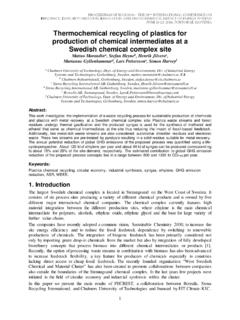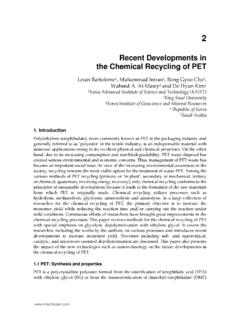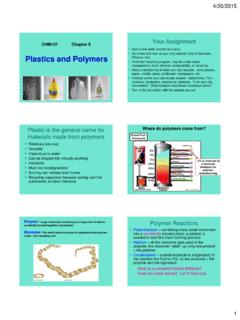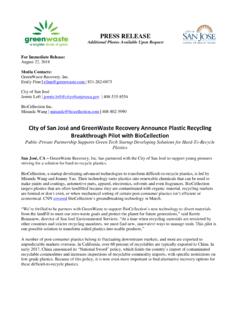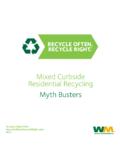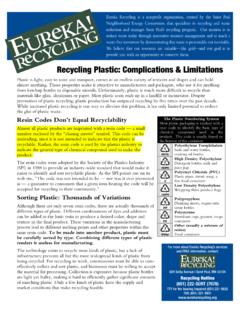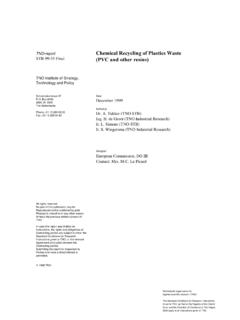Transcription of Recycling Plastics: Starting a business [en]
1 Recycling plastics . Starting A business . Introduction Sooner or later, everything we use and consume becomes waste, including all these nice plastic items and plastic bags we use every day. Plastic consumption is rising and with it the amount of plastic ending up as waste. Managing plastic waste is a global problem with increasing amounts of waste in developing countries as well as industrialised nations. There is a need for environmental sound solutions as environmental considerations gain ground legislation changes all around the world. Sustainable development is at the top of all agendas in the UN, EU.
2 And national governments. Better solutions for the rapidly growing amounts of plastic waste are in demand. High prices of virgin materials will also make Recycling attractive. These developments offer opportunities to people in Bowls made form recycled plastic, developing countries enabling new economic activities Galle, Sri Lanka. (Zul / Practical Action). through the collection, sorting and Recycling of plastic waste material. This technical brief gives an overview of technical and economical aspects involved in these activities; it is intended primarily for entrepreneurs thinking of setting up their own plastic Recycling business and for organisations dealing with communities in urban low-income areas and who seek opportunities either to create or to increase employment.
3 What are plastics ? plastics are made up of long chain molecules called polymers. Various types of polymers can be made from hydrocarbons derived from coal, natural gas, oil and organic oils which are transformed into materials with desirable properties. plastics that can be readily recycled are Thermoplastics which means they will soften when heated. Thermosetting plastics harden when heated, are often used in electrical applications and are not suitable for Recycling . Thermoplastics are light, durable, mouldable, hygienic and economic, making them suitable for a wide variety of applications including food and product packaging, car manufacturing, agriculture and housing products.
4 Thermoplastics can be repeatedly reformed into new products and are the focus of this technical brief. Practical Action, The Schumacher Centre, Bourton on Dunsmore, Rugby, Warwickshire, CV23 9QZ, UK. T +44 (0)1926 634400 | F +44 (0)1926 634401 | E | W _____. Practical Action is a registered charity and company limited by guarantee. Company Reg. No. 871954, England | Reg. Charity | VAT No. 880 9924 76 |. Patron HRH The Prince of Wales, KG, KT, GCB. Recycling of plastics Practical Action Environmental concerns of plastics plastics have their impact on the environment through all stages of their existence from manufacture, to utilization and disposal.
5 Manufacturing requires significant quantities of fossil fuels, a non-renewable resource. Burning of plastics releases smoke which contaminates the environment. The smoke contains small particulates, hazardous substances and green house gases. The disposal of plastics products also contributes significantly to their environmental impact. Most plastics are not biodegradable and can persist in the environment for many years. plastics can cause blockage of drainage and sewage systems resulting in water logging, flooding and spread of water born diseases. With more and more plastics products, particularly packaging, being disposed of soon after their purchase, the landfill space required by plastics waste is a growing concern.
6 Why recycle plastics ? Recycling plastics has many benefits, it contributes to energy savings and the reduction of greenhouse gas emissions. It also saves non-renewable sources like oil and gas. In addition to that, Recycling provides livelihood for millions of people and families in developing countries, either in the form of formal employment or informal economic activities. Although there is also a rapid growth in plastics consumption in the developing world, particularly due to the increasing demand for plastics from Asia, plastics consumption per capita in developing countries is much lower than in the industrialised countries.
7 However, there is a much wider scope for Recycling in developing countries due to several factors: Labour costs are lower. In many countries there is an existing culture of reuse and Recycling , with the associated system of collection, sorting, cleaning and reuse of waste' or used materials. There is often an informal sector' which is ideally suited to taking on small-scale Recycling activities. Such opportunities to earn a small income are rarely missed by members of the urban poor. There are fewer laws to control the standards of recycled materials. (This is not to say that standards can be low the consumer will always demand a certain level of quality).
8 Transportation costs are often lower, with hand or ox carts often being used. Low cost raw materials give an edge in the competitive manufacturing world. Innovative use of scrap machinery often leads to low entry costs for processing or manufacture. In developing countries the scope for Recycling of plastics is growing as the amount of plastic being consumed increases. Collecting, sorting and Recycling plastic waste becomes a viable activity. Types of plastics The six most common types of plastic can easily be recycled. The plastics industry has voluntarily devised a coding system which makes Recycling plastics easier.
9 Table 1 shows these 6 types of plastics with their identification code, general properties and common uses. Type of plastic Identification General properties Common uses code Polyethylene Clear Mineral water bottles terephthalate Hard 2 liter soda bottles (PET/PETE) Tough Cooking oil bottles Barrier to gas and water Powder detergent Resistance to heat jars Resistance to grease/oil Fibre for clothing Fibre for carpets Strapping Peanut butter jars 2. Recycling of plastics Practical Action High density Barrier to water Jerry cans polyethylene chemical resistance Crinkly shopping bags (HDPE) Hard to semi-flexible Film Strong Milk packaging Soft waxy surface Toys Low cost Buckets Permeable to gas Natural milky white colour Rigid pipes Crates Bottle caps Polyvinyl chloride Transparent Pipes and fittings (PVC) Hard, rigid (flexible when Carpet backing plasticised)
10 Window frames Good chemical resistance Water, shampoo and Long term stability vegetable oil bottles Electrical insulation Credit cards Low gas permeability Wire and cable sheathing Floor coverings Shoe soles and uppers Low density Tough Agricultural films polyethylene Flexible Refuse sacks (LDPE) Waxy surface Packaging films Soft - scratches easily Foams Good transparency Bubble wrap Low melting point Flexible bottles Stable electrical properties Moisture barrier Wire and cable applications Poly Excellent chemical resistance Yoghurt containers propylene (PP) High melting point Potato crisp bags Hard, but flexible Drinking straws Waxy surface Medicine bottles Translucent crates, Strong plant pots Car battery cases Heavy gauge woven bags Polystyrene (PS) Clear to opaque Packaging pellets Glassy surface Yoghurt containers Rigid Fast food trays Hard disposable cutlery Brittle Coat hangers High clarity Affected by fats and solvents Other plastics Mostly not available in sufficient quantities for Recycling Table 1: Types of plastics and common uses (source: ).


